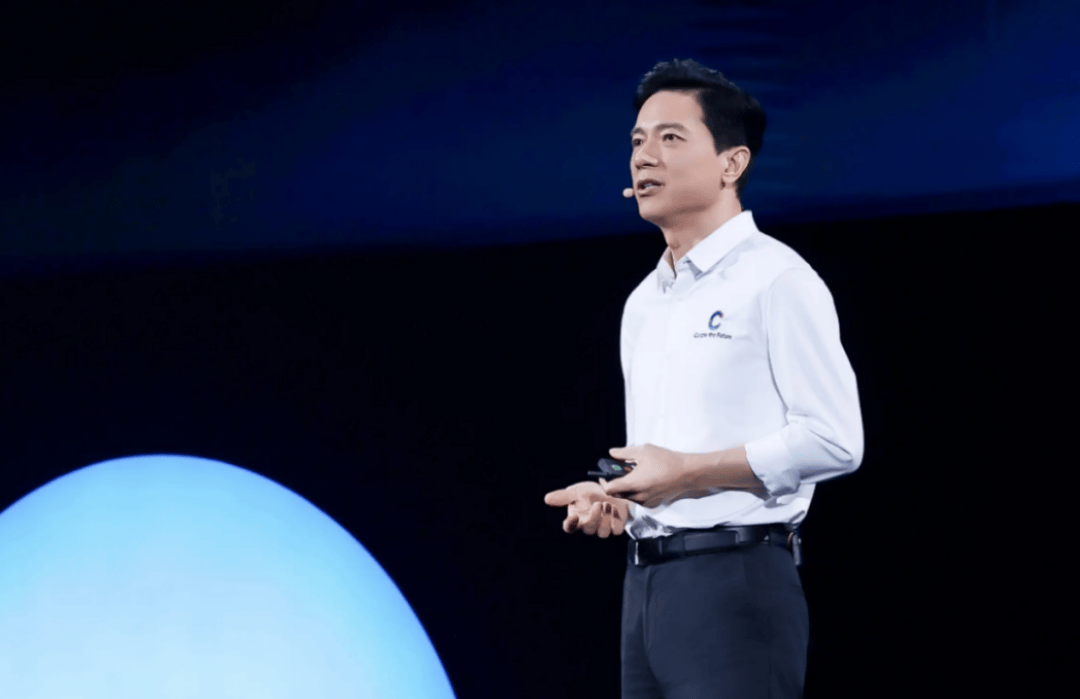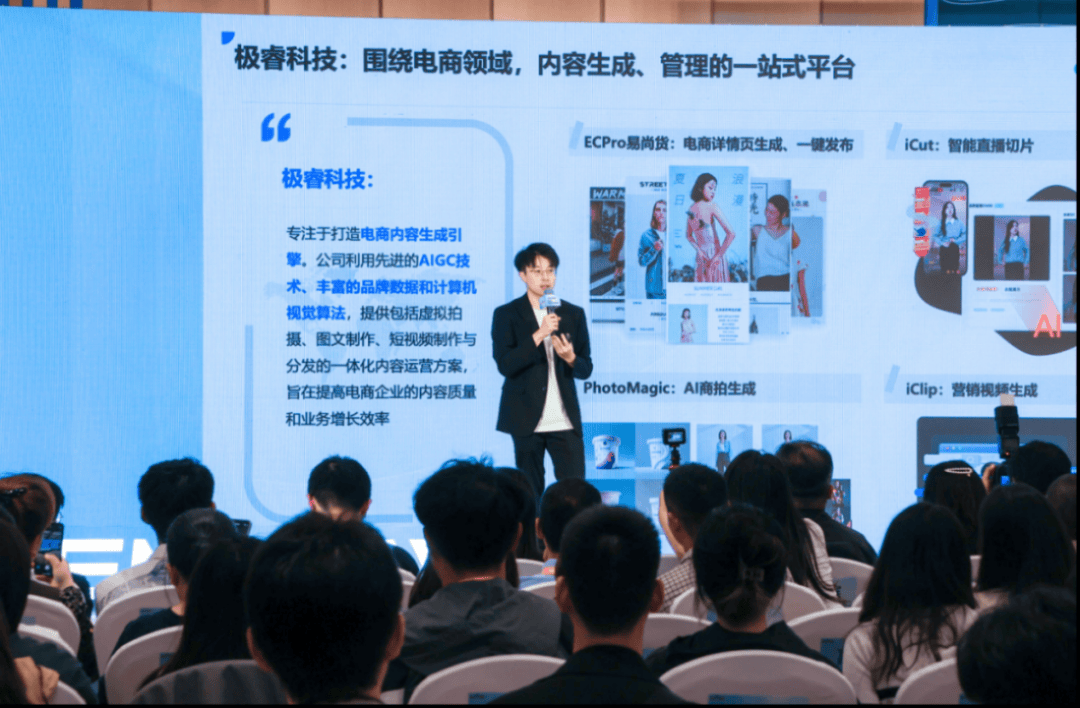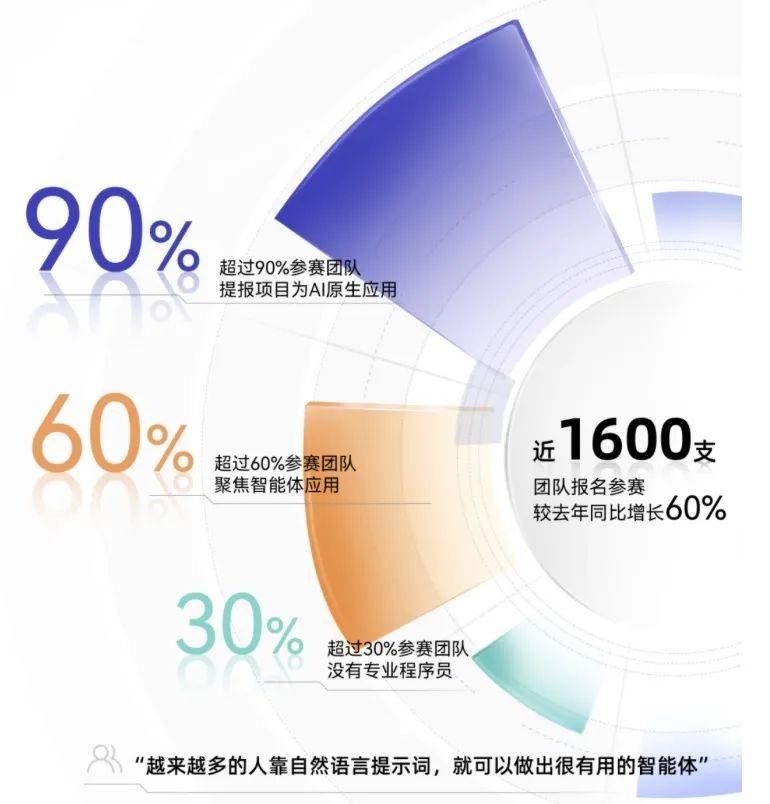Who can quench the thirst of AI developers?
![]() 09/26 2024
09/26 2024
![]() 471
471

"Participants today are increasingly picky, focusing solely on prizes and event influence. Some specifically target online competitions, which may not offer substantial prizes but save time and effort," an independent developer calmly remarked to 'Shixiang'.
This year, the popularity of AI developer competitions continues to soar. According to 'Shixiang' statistics, 19 different types of AI competitions have debuted in September alone, organized by internet giants such as ByteDance Doubao, Iflytek, Meitu, Baidu, and Kuaishou Keling, as well as traditional listed companies and chip manufacturers who are not to be outdone.
Currently, large AI models have significantly improved production efficiency, accelerating the expansion of application scenarios and the innovation of functional experiences. With the endless emergence of AI applications and the continuous evolution of the development ecosystem, the industry is in the midst of a fierce race.
In technology implementation and innovation, the role of AI developers is irreplaceable. Whether they are star teams with prestigious educational backgrounds, independent developers, or university students, they all invest their passion and courage. However, the challenges they face are equally daunting, including resource scarcity, intense market competition, and rapid technological iterations.
"Participating in competitions is not just for prizes; it's also about securing technical and resource support," highlighting the importance of competitions. Platforms that provide developers with technology, funding, ecosystems, resources, networks, and traffic become scarce opportunities for AI developers to achieve 'intelligence emergence,' but such resources are scarce.
On September 25, the results of the second season of the 'Wenxin Cup' Entrepreneurship Competition were announced. Organized by Baidu, the competition attracted nearly 1,600 projects, with over 60% of teams focusing on AI agent applications and over 30% without professional programmers. Ultimately, eight startup teams received tens of millions of yuan in cash and resource support from Baidu, while 13 university teams won nearly one million yuan in cash prizes.
Through the 'Wenxin Cup' competition, we gain a glimpse into the universal challenges faced by AI developers and the vast potential of AI applications.
01 AI Developers: Reshaping Amid Challenges
"This is undoubtedly the most talent-dense group in China," commented an industry insider to 'Shixiang,' yet the veil surrounding this group remains partially drawn. As an emerging field, generative AI is still in its infancy, and outside perceptions of AI developers remain vague.
Previously, InfoQ's 'China Generative AI Developer Insights 2024' report outlined the contours of this group. The report revealed that generative AI developer team members are generally young, hold top university degrees, and have accumulated rich experience in core businesses at globally renowned technology companies or research institutions.
AI developers tend to have relatively short careers. In terms of team size, about 52% of AI R&D teams have fewer than 20 members, with small and efficient teams becoming the norm. These teams possess a wide range of skills, including algorithms, engineering, testing, and product development, enabling rapid iteration.
The paper data was corroborated in the 'Wenxin Cup.' Award-winning team profiles frequently featured prestigious universities like Tsinghua, the Chinese Academy of Sciences, and Cambridge, as well as experience at renowned companies.
The most notable characteristics are undoubtedly 'youthfulness' and 'small teams.'
In the startup group, Kotoko, a virtual character social interaction platform that won second prize, is led by CEO Qiao Haixin (born in 1997) and CPO Zhu Jinghan (born in 1995). Similarly, the award-winning comprehensive education AI tutor 'Shizhe AI' team comprises CEO Liu Chunjiang (born in 1997) and CTO Chen Zhangquan (born in 2000).
In the university group, the 'small team' characteristic is even more pronounced. The core members of the first-prize-winning Aiuni AI and Besafe teams number fewer than 10, showcasing highly streamlined and efficient team structures.
According to Baidu, the proportion of large model application projects in this year's competition rose from 80% last year to over 90%, covering various fields such as entertainment, e-commerce, marketing, healthcare, office, hardware, and enterprise services.
This trend reflects the shifting focus of AI developers towards application-level innovation. A team leader at the competition remarked, "We focus on how AI technology can truly solve customers' practical problems, not just showcase technical prowess. The true value of applications lies in their profound understanding of business scenarios and tangible effects."
Although development frameworks and code tools based on large AI models significantly reduce development complexity and enhance deployment and application convenience, the path for AI developers remains challenging and far from smooth.
"The core issue is the 'hammer looking for nails' phenomenon persists. It's difficult but essential to deeply understand customer and user needs, accurately identify suitable industries and application scenarios, validate PMF (Product-Market Fit), and accelerate commercial growth," pointed out a developer to 'Shixiang.'
Currently, the issue of commercial monetization for AI developers remains severe. Many rely on technical services for survival and seek breakthroughs in application launches and innovative business models.
Award-winning projects in the 'Wenxin Cup' may offer partial solutions to these challenges. On-site, multiple award-winning teams showcased their application development innovations, converting ideas into practical applications despite funding and technical hurdles. Several have already achieved commercial success.

Jirui Technology, the one-stop AI e-commerce content tool that won first prize, has launched the ECGPT+FashionCLIP base model and various vertical e-commerce large models, supporting functions such as AI product photography, AI layout updates, AI live streaming clips, AI-generated product videos, AI product promotion, a one-stop AI technology and data service platform, and an intelligent product operation system. It has collaborated with over 40,000 e-commerce customers.
02 Ideal Large Model Platform Elements
"In the early stages of AI development, developers' focus is no longer on building complex models from scratch but on leveraging existing large model platforms to quickly bring products to market and validate them effectively," expressed a developer to 'Shixiang.'
'Borrowing a boat to sail the sea and rapidly validating the market is crucial.' By leveraging mature large models, developers can bypass complex underlying development processes and focus on application-level innovation, significantly saving time and resources.
Currently, domestic large model technology has surpassed competitors in multiple vertical fields, particularly in local language and cultural understanding. Developers often prefer technical solutions that closely align with their needs when selecting models.
In fact, many participating teams in this competition initially developed their models or optimized open-source models but ultimately chose the Wenxin large model as their primary development tool. For example, Jirui Technology CEO Wu Bin revealed to 'Shixiang' that their underlying model solutions included self-developed e-commerce models, optimized open-source models, and the Wenxin API interface. They chose the Wenxin large model due to its high-quality Chinese generation results, open ecosystem, efficiency, and ease of use, enabling rapid commercial application integration.
This was not uncommon in this year's 'Wenxin Cup.' Besides model capabilities, Baidu's complete toolchain, inference cost advantages, and competition empowerment also became significant factors in developers' choices.
According to the 'China Generative AI Developer Insights 2024' report, many AI developers believe that a comprehensive application development toolchain can significantly enhance R&D efficiency. The primary challenge in current development lies in the lack of model evaluation and tuning tools, creating a bottleneck for most developers.
While various application development toolchains exist, the key for AI developers is whether the tools meet actual business needs, ensuring that developed applications possess sufficient market competitiveness and technical depth. Baidu's previously launched AgentBuilder, AppBuilder, and ModelBuilder, which cover developers' diverse needs from underlying technology to application deployment, received widespread praise from developers at the competition.
Training and inference cost optimization also garnered attention. This year, the large model price war has intensified, with Baidu increasing investments in this area. In May, Baidu Intelligent Cloud announced the free opening of ERNIE series model pre-trained services. In July, ERNIE 4.0 and ERNIE 3.5 models significantly reduced prices, further lowering the cost threshold for developers and promoting the popularization of AI applications.
As training and inference costs continue to decline, developers will benefit from this trend, further accelerating the commercialization of AI technology.
However, most AI teams still face financial and technical resource pressures, with intense market competition and limited resources exacerbating survival difficulties. Additionally, AI technology updates rapidly, requiring developers to maintain rapid learning and adaptability to stay ahead in the competition.

Baidu's 'Wenxin Cup' Entrepreneurship Competition addresses these pain points for AI developers by providing comprehensive support.
Financially, the competition offers tens of millions of yuan in cash and resource investments, alleviating funding pressures for startups. Technically, Baidu provides development tools, course resources, and expert face-to-face guidance, sharing product and technical experience to help developers rapidly improve their skills.
Furthermore, participants have opportunities to engage with top fund investors, broaden financing channels, and accelerate project launches. Through Baidu's distribution capabilities, entrepreneurs can leverage the Baidu search platform to quickly tap into the market. Baidu's intelligent agents distribute over ten million pieces of content daily and continue to grow.
This support helps AI developers quickly enter the market, gain a competitive edge, and further accelerate their commercialization processes.
03 Collaborating with Baidu to Promote AI Application Prosperity
Robin Li has repeatedly emphasized a core viewpoint on multiple occasions: focusing solely on large model competition is meaningless; the real opportunity lies in AI application competition.
Recently, Zhu Xiaohu also expressed optimism about the prospects of AI applications in an interview. Judging from the moves of major technology companies, the implementation of AI applications has become an industry consensus. However, the current reality is that AI applications have fallen into severe competition.
Huatai Securities compared the top 100 AI applications globally visited in September 2023 and June 2024. The results showed that less professional applications that fail to effectively address user pain points are rapidly being replaced by more specialized counterparts. For example, although the office application Tome offers one-click PPT generation, its traffic significantly declined as competitors like Prezi significantly improved their functionalities, due to Tome's overly simple template designs and lack of online editing capabilities.
This indicates that while generative AI Endow Endow Endow Endow some applications an early mover advantage, they can still be surpassed by competitors if they lack sufficient competitive barriers.
The core of market competition lies in whether applications can consistently provide more professional functionalities and optimizations rather than relying solely on early innovation to attract users.
A successful AI application development team must deeply analyze competitors to find differentiated competitive paths. Jirui Technology CEO Wu Bin shared his competitive strategy with 'Shixiang': multi-platform advantages, allowing clients to operate across platforms where internet giants struggle to create cross-platform tools, making Jirui suitable for multi-channel operations; full-chain advantages, as Jirui is the only company providing a full-chain e-commerce marketing content service; and automation advantages, with Jirui accumulating rich algorithmic experience since 2019 to gradually achieve multi-faceted automation.
This case demonstrates the challenges in standing out in the fierce competition for AI applications. In this context, an external large model platform that provides multi-layered support becomes crucial.
Baidu is committed to promoting the prosperity of the AI-native application ecosystem and, through the 'Wenxin Cup' Entrepreneurship Competition, provides a platform for developers to showcase their talents and access resources, helping them stand out in the market.
Robin Li stated, "Baidu hopes to collaborate with all entrepreneurs to co-create a thriving AI-native application and intelligent agent ecosystem, helping entrepreneurs find PMF earlier and develop super apps in the AI era."
In promoting the AI application ecosystem, Baidu not only provides development support but also derives multiple strategic benefits. By building a series of tools and platforms, Baidu precisely positions itself in the AI development layer, facilitating the rapid implementation of AI applications. Specifically, by offering development frameworks, code tools, and a one-stop AI large model development service that enables developers to easily invoke base large models through APIs for model construction, training, deployment, and operations, covering the entire development cycle.
This service model is poised to become a new norm for large model platforms in the AI era, creating more innovation opportunities for developers while consolidating Baidu's position in the AI ecosystem, achieving a win-win situation for both the platform and developers.





